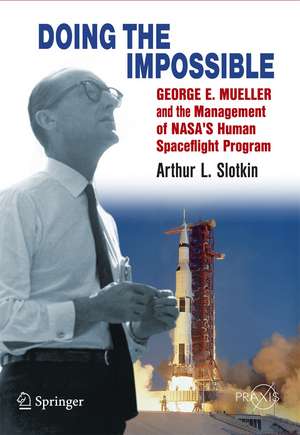Doing the Impossible: George E. Mueller and the Management of NASA’s Human Spaceflight Program: Springer Praxis Books
Autor Arthur L. Slotkinen Limba Engleză Paperback – 25 iul 2012
Following the contributions of George E. Mueller, in this unique book Arthur L. Slotkin answers such questions as: exactly how did the methods developed for use in the Air Force ballistic missile programs get modified and used in the Apollo Program? How did George E. Mueller, with the help of others, manage the Apollo Program? How did NASA centers, coming from federal agencies with cultures of their own, adapt to the new structured approach imposed from Washington?
George E. Mueller is the ideal central character for this book. He was instrumental in the creation of Apollo extension systems leading to Apollo, the Shuttle, and today’s ISS and thus was a pivotal figure in early American human spaceflight history.
Din seria Springer Praxis Books
-
 Preț: 294.46 lei
Preț: 294.46 lei -
 Preț: 223.45 lei
Preț: 223.45 lei -
 Preț: 193.12 lei
Preț: 193.12 lei -
 Preț: 167.85 lei
Preț: 167.85 lei -
 Preț: 288.98 lei
Preț: 288.98 lei -
 Preț: 323.74 lei
Preț: 323.74 lei -
 Preț: 376.08 lei
Preț: 376.08 lei -
 Preț: 264.12 lei
Preț: 264.12 lei - 8%
 Preț: 517.61 lei
Preț: 517.61 lei -
 Preț: 190.01 lei
Preț: 190.01 lei -
 Preț: 218.16 lei
Preț: 218.16 lei -
 Preț: 312.06 lei
Preț: 312.06 lei - 17%
 Preț: 401.17 lei
Preț: 401.17 lei -
 Preț: 216.41 lei
Preț: 216.41 lei -
 Preț: 262.27 lei
Preț: 262.27 lei -
 Preț: 264.35 lei
Preț: 264.35 lei -
 Preț: 167.63 lei
Preț: 167.63 lei -
 Preț: 259.52 lei
Preț: 259.52 lei -
 Preț: 259.08 lei
Preț: 259.08 lei -
 Preț: 305.47 lei
Preț: 305.47 lei -
 Preț: 234.01 lei
Preț: 234.01 lei -
 Preț: 227.85 lei
Preț: 227.85 lei -
 Preț: 259.95 lei
Preț: 259.95 lei -
 Preț: 295.56 lei
Preț: 295.56 lei -
 Preț: 357.17 lei
Preț: 357.17 lei -
 Preț: 275.79 lei
Preț: 275.79 lei -
 Preț: 257.08 lei
Preț: 257.08 lei -
 Preț: 349.71 lei
Preț: 349.71 lei -
 Preț: 272.45 lei
Preț: 272.45 lei -
 Preț: 270.27 lei
Preț: 270.27 lei - 8%
 Preț: 433.24 lei
Preț: 433.24 lei -
 Preț: 327.03 lei
Preț: 327.03 lei - 8%
 Preț: 394.80 lei
Preț: 394.80 lei -
 Preț: 320.65 lei
Preț: 320.65 lei -
 Preț: 325.29 lei
Preț: 325.29 lei -
 Preț: 253.11 lei
Preț: 253.11 lei -
 Preț: 192.86 lei
Preț: 192.86 lei -
 Preț: 313.40 lei
Preț: 313.40 lei -
 Preț: 150.51 lei
Preț: 150.51 lei -
 Preț: 233.34 lei
Preț: 233.34 lei -
 Preț: 286.78 lei
Preț: 286.78 lei -
 Preț: 212.01 lei
Preț: 212.01 lei -
 Preț: 366.83 lei
Preț: 366.83 lei -
 Preț: 274.68 lei
Preț: 274.68 lei -
 Preț: 232.27 lei
Preț: 232.27 lei -
 Preț: 284.58 lei
Preț: 284.58 lei -
 Preț: 212.45 lei
Preț: 212.45 lei -
 Preț: 159.81 lei
Preț: 159.81 lei -
 Preț: 349.48 lei
Preț: 349.48 lei - 20%
 Preț: 2061.61 lei
Preț: 2061.61 lei
Preț: 310.99 lei
Nou
Puncte Express: 466
Preț estimativ în valută:
59.52€ • 61.90$ • 49.81£
59.52€ • 61.90$ • 49.81£
Carte disponibilă
Livrare economică 21 februarie-07 martie
Preluare comenzi: 021 569.72.76
Specificații
ISBN-13: 9781461437000
ISBN-10: 1461437008
Pagini: 300
Ilustrații: XXV, 306 p. 20 illus., 9 illus. in color.
Dimensiuni: 168 x 240 x 23 mm
Greutate: 0.57 kg
Ediția:2012
Editura: Springer
Colecția Springer
Seriile Springer Praxis Books, Space Exploration
Locul publicării:New York, NY, United States
ISBN-10: 1461437008
Pagini: 300
Ilustrații: XXV, 306 p. 20 illus., 9 illus. in color.
Dimensiuni: 168 x 240 x 23 mm
Greutate: 0.57 kg
Ediția:2012
Editura: Springer
Colecția Springer
Seriile Springer Praxis Books, Space Exploration
Locul publicării:New York, NY, United States
Public țintă
Popular/generalCuprins
Illustrations.- Tables.- Foreword.- Acknowledgments.- Introduction.- Chapter 1: Reorganizing.- Chapter 2: Program management.- Chapter 3: Getting Ready.- Chapter 4: Resuming Flight.- Chapter 5: Learning, developing, and planning.- Chapter 6: Peaks and valleys.- Chapter 7: Recovery.- Chapter 8: All-up testing.- Chapter 9: Orbiting the Moon.- Chapter 10: A railroad in space.- Epilogue.- Bibliography.- Abbreviations.- Index.
Recenzii
From the reviews:
“The author provides a valuable account of Mueller’s contributions, recounting how Mueller had to overcome the conflicts and problems among NASA centers … to achieve his goals. … Illustrations include both halftone and color photographs. Summing Up: Recommended. Lower-division undergraduates through researchers/faculty; general readers.” (J. Z. Kiss, Choice, Vol. 50 (6), February, 2013)
“The author provides a valuable account of Mueller’s contributions, recounting how Mueller had to overcome the conflicts and problems among NASA centers … to achieve his goals. … Illustrations include both halftone and color photographs. Summing Up: Recommended. Lower-division undergraduates through researchers/faculty; general readers.” (J. Z. Kiss, Choice, Vol. 50 (6), February, 2013)
Notă biografică
With degrees in aerospace engineering, Arthur L. Slotkin worked for the AIAA and wrote about the space program In the early 1970s. Joining the System Development Corporation he assisted George E. Mueller and continued to support him after Mueller’s retirement in 1983. After a 30 year career in the computer software and services industry, Slotkin earned another graduate degree in the history of technology and spent the last eight years researching and writing this book. The ideas and innovations Mueller brought to NASA from the Air Force ballistic missile program are highlighted.
Textul de pe ultima copertă
This excellent account of one of the most important personalities in early American human spaceflight history describes for the first time how George E. Mueller, the system manager of the human spaceflight program of the 1960s, applied the SPO methodology and other special considerations, resulting in the success of the Apollo Program. While Wernher von Braun and others did not really readily accept Mueller's approach to system management, they later acknowledged that without it NASA would not have landed astronauts on the Moon by 1969. While Apollo remained Mueller's top priority, from his earliest days at the agency he promoted a robust post-Apollo program, which culminated in Skylab, the Space Shuttle, and the International Space Station. As a result of these efforts, Mueller earned the sobriquet: "the father of the Space Shuttle."
Caracteristici
Presents a fascinating insight into the management of NASA's Apollo Program Explains how a single indivdual, George E. Mueller, introduced new approaches to NASA Gives historical perspectives of the Apollo program and details of systems management of large projects Shows how President Kennedy's goal of landing an astronaut on the Moon and returning him safely was achieved















